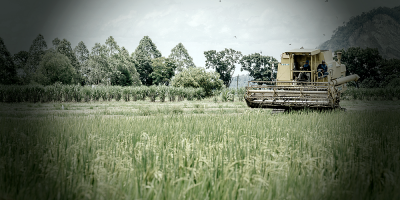
Reports on food insecurity and price escalation have recently been among the most discussed subjects in the mainstream media.
The United Nations Committee on World Food Security defines food security as having constant, physical, social and economic access to enough, safe and nourishing food that satisfies a population’s dietary needs and food preferences for an active and healthy life.
According to the Department of Statistics Malaysia (DOSM), Malaysia imported RM55.5 billion in food products in 2020 compared to RM33.8 billion in exports.
This rapid increase in imports compared to exports has led to an increase in the trade deficit of food products which amounted to RM21.7 billion in 2020, an increase of 24.9 per cent compared to the previous year.
It has also been observed that only 19 items under the selected agricultural commodities recorded a Self-Sufficiency Ratio (SSR) of more than 100.0% in 2020 compared to 25 items in 2019.
The World Health Organisation (WHO) indicated that 2.3 billion people worldwide (29.3 per cent) experienced moderate to severe food insecurity in 2021, 350 million more than before the COVID-19 pandemic.
Additionally, nearly 924 million people (11.7 per cent of the world’s population), experienced severe food insecurity, an increase of 207 million in two years.
An important question is what has led to this widespread problem.
The following are some of the notable causes:
1. Higher temperatures and unreliable rainfall have made farming difficult.
According to National Oceanic and Atmospheric Administration (NOAA)’s 2021 Annual Climate Report, the combined land and ocean temperature has increased at an average rate of 0.08 degrees Celsius per decade since 1880; however, the average rate of increase since 1981 (0.18°C) has been more than twice that rate.
In addition, droughts are estimated to have caused a cereal (maize, rice, and wheat) loss of 1820 million megagram (Mg) globally over the last four decades (Lesk et al., 2016).
2. Wars have forced farmers to flee their land or fight in conflicts. For example, the South Sudan region has faced conflict for years, with four million people facing food insecurity.
Additionally, the supply of essential goods has drastically decreased due to the war in Ukraine and the sanctions imposed on Russia.
Together Russia and Ukraine export nearly a third of the world’s wheat and barley, more than 70% of its sunflower oil and are also big suppliers of corn. Russia is also the world’s top global fertiliser producer.
3. Poverty: when people have less money, they cannot afford food and become unable to work.
Families in developing countries spend a large proportion of their income on food. Malaysia’s poverty rate increased to 8.4 per cent in 2020 due to the COVID-19 pandemic, and COVID-19 has broadly impacted food security in Asia.
4. Supply chain bottlenecks: various supply chain bottlenecks have emerged as a result of strong overall demand from the economic recovery (due to the impact of COVID-19), the sharp increase in the relative demand for durable goods, and hoarding and panic buying.
5. The world produces enough food to feed everyone, according to a World Economic Forum report.
Uneven food distribution, on the other hand, is a major concern for food security, as millions go hungry while others have so much that obesity becomes a problem.
According to the World Health Organisation (2016), approximately two billion adults are overweight, 650 million are obese (BMI 30 kg/m2), and 1.02 billion are chronically hungry.
Globally, supply shocks caused by factors such as climate change, conflict and supply chain disruptions have resulted in food inflation.
According to the World Bank, the global agricultural price index was 19% higher in July 2022 than in January 2021. Maize and wheat prices are 15% and 24% higher than in January 2021.
Similarly In Malaysia, food inflation reached a new high of 6.1 per cent in June 2022, the highest level since November 2011. (Department of Statistics Malaysia, 2022).
Globally, several initiatives have been launched to combat food inflation. Those initiatives include:
1. Raising interest rates. Central Banks generally believe that interest rate hikes increase the cost of borrowing money while also providing a greater incentive for people to save more, thus discouraging spending or borrowing.
For example, The Federal Reserve (the central bank of the United States of America) raised interest rates three times in 2022, most recently by 0.75 percentage points in July, bringing the benchmark rate to a range of 2.25-2.5 per cent.
On the other hand, Bank Negara Malaysia (BNM) has raised the overnight policy rate (OPR) twice this year, from 1.75 per cent to 2.25 per cent.
2. Support production and producers. The World Bank has argued that countries worldwide should try to boost next season’s output by removing input trade barriers, focusing on more efficient fertiliser use, and repurposing public policies and expenditures to support farmers and output better.
Similarly, to increase food supplies, the Malaysian government agreed in May 2022 to eliminate the need for an approved permit (AP) to import food into the country, and in July, the ceiling price for chicken was raised to RM9.40 per kg.
3. Enhance food assistance. The World Bank has suggested that countries expand targeted, nutrition-sensitive social protection programmes and replenish early-response financing mechanisms.
For example, RM1.74 billion has been allocated under Phase 2 of the Bantuan Keluarga Malaysia (BKM) scheme which will benefit 12.6 million people or 60% of the adult population in Malaysia.
In conclusion, the above initiatives may tame food inflation in the short run, but their long-run effectiveness remains questionable.
As a result, policymakers should investigate ways to increase the country’s self-sufficiency and reduce reliance on imports.
Hence, long-term policies should prioritise irrigation improvement, the promotion of aeroponics and hydroponics, and the implementation of the New Green Revolution to increase food supplies.
(Goh Lim Thye is Senior Lecturer, Department of Economics and Applied Statistics, Universiti Malaya.)
ADVERTISEMENT
ADVERTISEMENT








































